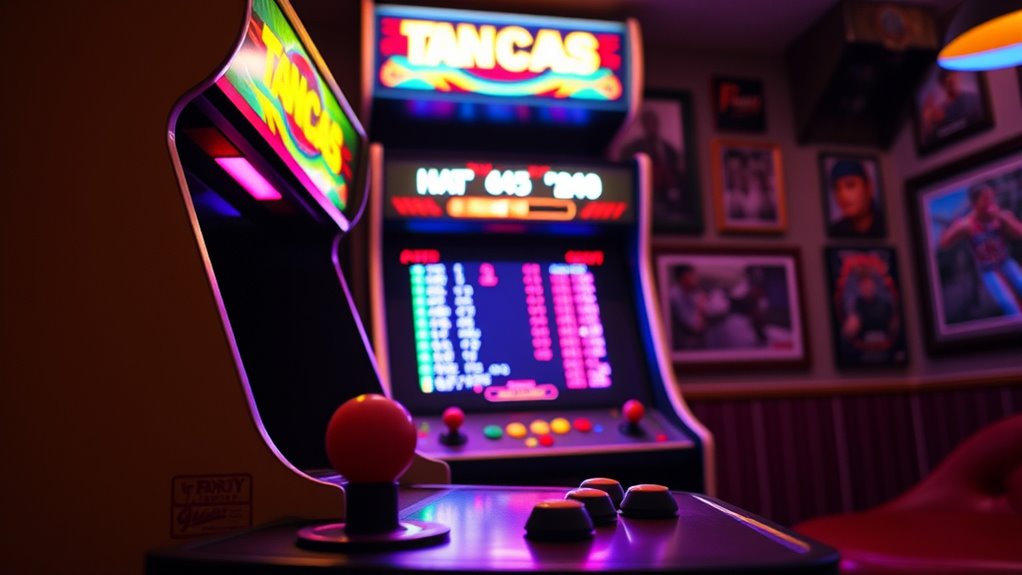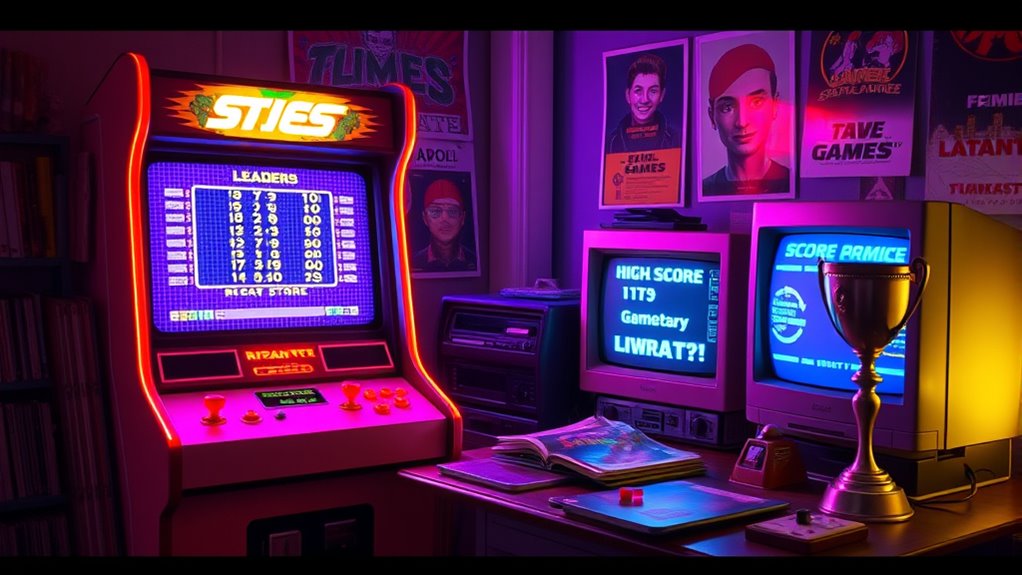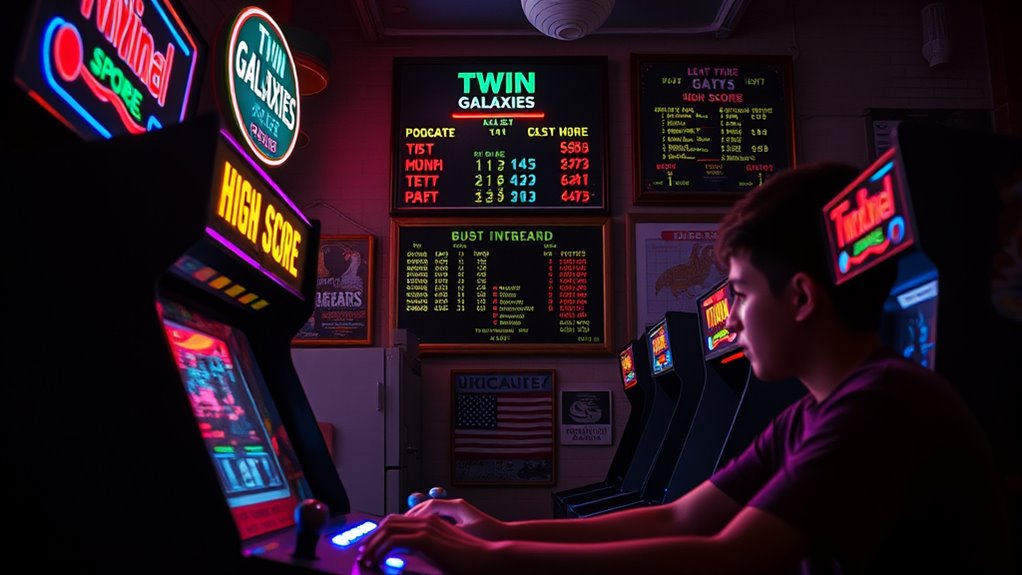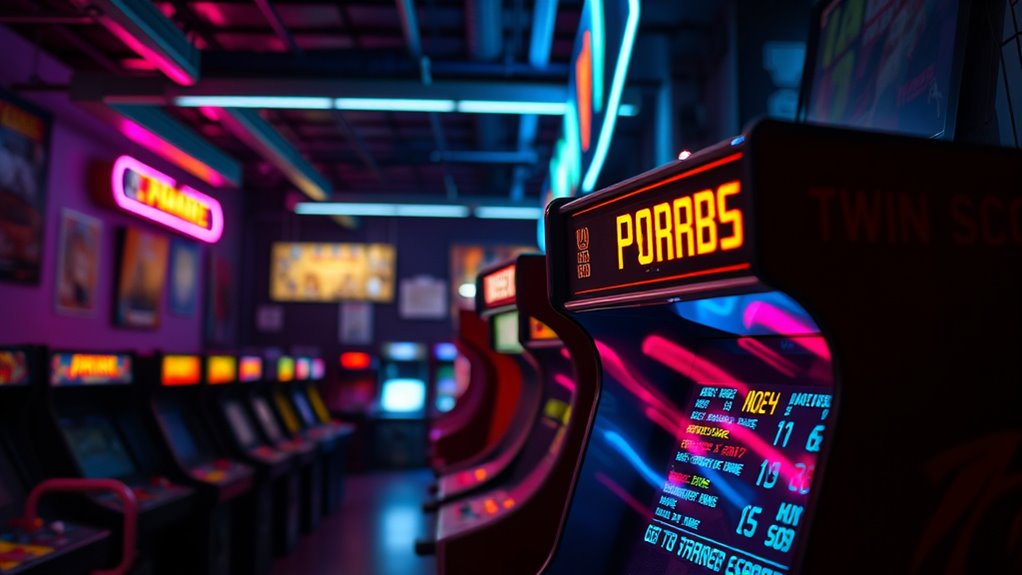High-score culture is driven by your desire for mastery, recognition, and community rivalry, with Twin Galaxies acting as the key authority for verifying records. They guarantee fairness by setting standards, but controversies over proof and cheating have challenged their legacy. Digital tech now helps verify achievements swiftly and accurately. Understanding this history reveals how competitive gaming’s roots influence today’s esports and record-keeping, offering more insights into this enduring legacy.
Key Takeaways
- Twin Galaxies serves as the authoritative body verifying and authenticating arcade high scores, ensuring credibility and fairness.
- High-score culture symbolizes mastery, legacy, and community recognition, evolving through technological advances and record standards.
- Notable figures and milestones in arcade gaming inspire competition, pushing players to achieve groundbreaking records.
- Challenges such as score inflation, cheating, and inconsistent evidence verification have driven stricter standards and transparency.
- The legacy influences modern esports, leaderboard practices, and preserves gaming history, fostering ongoing passion and community engagement.
The Origins of High-Score Pursuits in Arcade Gaming

The pursuit of high scores in arcade gaming began as a natural extension of players’ desire to master games and stand out from others. Arcade nostalgia fuels this drive, reminding you of simpler times when beating a record felt like a personal victory. High score psychology plays a vital role, as you’re motivated not just by competition but by the satisfaction of pushing your limits. Scoring high becomes a way to demonstrate skill and earn recognition within the gaming community. This motivation fosters a sense of achievement that keeps players coming back, seeking to improve their records. Over time, this drive transformed arcade gaming into a culture where scores symbolize mastery, creating a legacy rooted in personal challenge and communal pride. Understanding aura, or the energetic reflection of personal achievement, can also deepen the appreciation of this competitive spirit.
The Role of Twin Galaxies in Setting Record Standards

Twin Galaxies has played a pivotal role in establishing official standards for arcade and video game records, acting as the authoritative body that verifies and authenticates high scores. Your focus on leaderboard accuracy ensures that records are consistent and trustworthy across the gaming community. They implement rigorous record calibration procedures to validate each submission, reducing disputes and maintaining integrity. By setting clear guidelines, Twin Galaxies helps players understand what’s needed to achieve recognized high scores. Their verification process emphasizes transparency, making sure scores are genuine and accurately recorded. This standardization fosters fair competition and preserves the legitimacy of competitive gaming. As a result, Twin Galaxies’s role in record calibration and leaderboard accuracy becomes essential to sustaining a credible high-score culture. Regular checks on data security measures ensure the integrity of the scoring system and protect against payment data breaches that could undermine trust.
Notable Figures and Milestones in High-Score History

You’ve likely heard of legendary record holders who pushed gaming limits to new heights. Their pioneering achievements set milestones that define high-score culture today. Exploring their stories reveals how these figures shaped the legacy of competitive gaming. Additionally, understanding the high refresh rates and low input lag in gaming projectors provides insight into how technology supports these record-breaking performances.
Legendary Record Holders
Who are the legendary figures that have shaped high-score history, and what milestones define their achievements? These record holders exemplify achievement motivation and influence leaderboard psychology, inspiring others to push limits. Notable names include Billy Mitchell, who set classic arcade records, and Steve Wiebe, known for his perseverance. Their milestones serve as benchmarks, fueling competitive drive. Here’s a glimpse of some legendary record holders:
| Name | Notable Achievement |
|---|---|
| Billy Mitchell | Perfect Pac-Man score |
| Steve Wiebe | Long-standing Donkey Kong record |
| Todd Rogers | Classic Breakout high score |
| Thor Aackerlund | First world champion in competitive gaming |
| Walter Day | Twin Galaxies founder and record keeper |
These figures demonstrate how achievement motivation shapes high-score culture and keeps the competitive spirit alive. Inspiration from record-breaking achievements continues to motivate aspiring gamers worldwide.
Pioneering Achievements
Building on the legacy of legendary record holders, pioneering achievements in high-score history mark the moments when individuals pushed beyond existing limits to redefine what’s possible. These milestones evoke arcade nostalgia, reminding you of the golden era of gaming. Pioneers like Steve Wiebe and Billy Mitchell set records that inspired a new wave of players and fueled record preservation efforts. Their feats showcase how dedication and skill can elevate gameplay to an art form. These achievements aren’t just about the scores; they represent breakthroughs in competitive gaming and the importance of safeguarding gaming history. Recognizing high-score competitions highlights the competitive spirit and community engagement that drive progress in arcade gaming. By celebrating these milestones, you connect with a rich tradition of innovation and perseverance, ensuring that the legacy of high-score pioneers continues to inspire future generations.
The Impact of Digital Technologies on Score Verification

Digital technologies have revolutionized score verification by making the process faster, more accurate, and more transparent. With digital authentication, you can now verify records instantly, reducing the chances of falsification and human error. These innovations improve leaderboard accuracy by providing real-time data validation, ensuring that scores are legitimate and consistent across platforms. Automated systems analyze gameplay footage, timestamps, and sensor data, making it harder to manipulate results. This transparency fosters trust within the high-score community, allowing you to confidently accept new records. Additionally, ongoing developments in AI Security help identify and mitigate potential vulnerabilities in digital verification systems, further safeguarding the integrity of gaming achievements. Overall, digital tools streamline the verification process, making it easier to uphold the integrity of gaming achievements and maintain the legacy of organizations like Twin Galaxies.
Controversies and Challenges in Record Validation

You might wonder how officials verify high scores when evidence can be hard to confirm. Cheating and manipulation also threaten the integrity of records, making trust in official results questionable. Additionally, standardizing records across different games and platforms remains a persistent challenge. Implementing ethical hacking techniques could help identify potential vulnerabilities or discrepancies in the record validation process.
Evidence Verification Difficulties
Verifying high scores in competitive gaming proves to be a complex task, often marred by disputes over evidence authenticity. You may find it difficult to distinguish genuine achievements from instances of score inflation or manipulated recordings. Record authenticity is essential for maintaining integrity, yet inconsistent documentation or unclear footage can cast doubt on a player’s claims. Technical limitations, such as camera quality or video edits, complicate validation processes. When evidence is ambiguous or incomplete, authorities struggle to confirm whether a score genuinely reflects skill or was artificially enhanced. This challenge not only hampers fair competition but also fuels skepticism within the community. Ultimately, ensuring accurate verification demands rigorous standards and transparent procedures to prevent disputes and uphold the legitimacy of high scores. Additionally, the verification process often requires collaboration among community members, developers, and record-keeping organizations to establish trustworthy protocols.
Cheating and Manipulation
Cheating and manipulation pose significant hurdles in validating high scores, as some players attempt to gain unfair advantages through software hacks, hardware modifications, or recording tricks. Score manipulation undermines the integrity of the competitive landscape, leading to numerous cheating scandals that tarnish reputations and challenge record legitimacy. These scandals often involve players faking gameplay footage, using device modifications to enhance performance, or exploiting glitches to inflate scores. Such actions force organizations like Twin Galaxies to implement stricter verification processes, but they also fuel ongoing debates about fairness and the reliability of record validation. Despite these efforts, the temptation for some players to cheat persists, complicating efforts to establish a trustworthy high-score culture and maintain the legacy of genuine achievement. Understanding the importance of score validation helps in developing better detection methods and preserving the authenticity of competitive records.
Record Standardization Issues
Because record standards vary widely across different gaming communities and organizations, establishing a consistent and universally accepted validation process remains a major challenge. This inconsistency fuels concerns about score inflation, where players might push boundaries to set higher records without standardized proof. Without uniform rules, record consistency suffers, making it difficult to compare achievements fairly. Some communities rely on video evidence, while others accept subjective reports, leading to disputes and skepticism. The lack of clear, standardized criteria complicates efforts to verify exceptional performances and maintain the integrity of high-score rankings. As a result, players and organizers face ongoing debates about what qualifies as a legitimate record, highlighting the importance of establishing transparent, universal validation practices to preserve the credibility of competitive gaming achievements. Additionally, implementing standardized procedures can help foster greater fairness and trust within the competitive community.
The Evolution of Competitive Gaming Communities

The landscape of competitive gaming communities has transformed dramatically over the decades, driven by technological advances and shifting cultural attitudes. You’ve witnessed how arcade nostalgia fueled early score competitions, bringing players together in local arcades. As technology evolved, online platforms allowed you to connect globally, expanding the scope of competition. The rise of leaderboards and digital tracking made it easier to compare scores and showcase achievements. Communities now thrive on forums, streaming, and social media, fostering a sense of camaraderie and rivalry. You can participate in high-score challenges from anywhere, pushing the boundaries of what’s possible. This evolution reflects a shift from isolated arcade battles to a worldwide culture centered around shared passion, innovation, and the pursuit of excellence in gaming.
How High-Score Culture Influences Modern Esports

High-score culture has profoundly shaped modern esports by emphasizing individual skill, consistency, and the relentless pursuit of perfection. This focus fuels fierce competition, where players chase ever-higher scores amid rising score inflation. It creates a culture where breaking records gains immense cultural significance, motivating players to push boundaries. You might imagine:
- Players meticulously refining their techniques
- Record-breaking runs becoming legendary
- Fans passionately debating score legitimacy
- Tournaments valuing precision over teamwork
- The thrill of surpassing previous benchmarks
This environment elevates personal achievement, but also sparks debates about fairness and authenticity. The drive for higher scores influences game design, often prioritizing points over gameplay balance. Ultimately, high-score culture’s legacy persists, shaping esports into a domain where individual prowess and record-breaking moments define its cultural landscape.
The Legacy of Twin Galaxies in Gaming Culture Today

Have you ever wondered how Twin Galaxies continues to shape gaming culture today? Its legacy fuels arcade nostalgia, inspiring new generations to appreciate classic games and high-score achievements. The organization’s record-keeping and competitive spirit have influenced modern leaderboards and streaming platforms, emphasizing authenticity and verified accomplishments. Gaming memorabilia, like vintage arcade cabinets and signed score sheets, connect players to this history, creating a tangible link to gaming’s golden age. Twin Galaxies also fosters a community that values dedication and skill, shaping how gamers celebrate achievements today. Its impact is visible in the way players, collectors, and fans preserve gaming history, ensuring that the high-score culture remains a crucial part of gaming identity and storytelling in the digital age.
Future Trends in Achievement Recognition and Record Keeping
As gaming technology advances, achievement recognition and record keeping are poised to become more sophisticated and transparent. You’ll see systems that automatically verify scores, reducing the risk of score inflation or manipulation. These innovations will help maintain record longevity by ensuring data integrity over time. Imagine real-time leaderboards powered by blockchain, where every achievement is securely stored and instantly accessible. Enhanced AI verification tools will detect anomalies, preventing false claims. Virtual reality may introduce immersive achievements, making records more engaging and harder to falsify. You could also witness the rise of community-driven platforms that track progress across multiple games, preserving long-term records and fostering healthy competition. Ultimately, these trends will create a more trustworthy, dynamic environment for achievement recognition in gaming’s future.
Frequently Asked Questions
How Did High-Score Culture Influence Mainstream Entertainment and Media?
You see, high-score culture shaped mainstream entertainment and media by spotlighting competitive gaming, which fueled its popularity. Leaderboard controversies often made headlines, sparking debates about fairness and legitimacy. Media portrayal shifted to emphasize gamers’ skill and dedication, turning high scores into symbols of achievement. This influence helped gaming become a mainstream phenomenon, inspiring movies, TV shows, and coverage that celebrate the competitive spirit and the pursuit of excellence.
What Ethical Dilemmas Have Arisen From Record Disputes in Twin Galaxies?
You might wonder about record disputes in Twin Galaxies, which often involve cheating scandals and authenticity verification. These dilemmas challenge the integrity of high-score claims, forcing you to question whether achievements are genuine. When cheating scandals surface, they threaten trust, making verification processes vital. You need transparent, fair standards to uphold the community’s credibility, ensuring that records reflect true skill rather than dishonesty.
How Do Cultural Differences Affect High-Score Recognition Worldwide?
Imagine a global tapestry, vibrant with diverse colors and patterns, each representing different cultural perceptions. When it comes to high-score recognition worldwide, this diversity creates recognition disparities. You might celebrate a record in one country, while others overlook it due to differing values or standards. Cultural differences shape how achievements are valued, making it essential to bridge these gaps for fair acknowledgment across borders.
What Role Do Sponsorships and Advertising Play in Competitive High-Score Events?
Sponsorships and advertising play a vital role in competitive high-score events by driving sponsorship influence and shaping advertising strategies. When you participate, these sponsors provide funding, equipment, and promotional support, elevating the event’s visibility. They also influence the event’s branding and marketing efforts, attracting more viewers and players. This financial backing helps sustain the competition, making it more professional and engaging, ultimately boosting the event’s prestige and reach.
Can High-Score Achievements Impact a Player’S Long-Term Reputation or Career?
Your high-score achievements can skyrocket your reputation impact, turning you into a legendary figure in gaming circles. They open doors to exciting career opportunities, such as streaming, sponsorships, and coaching. However, a controversial or fragile record might also harm your credibility if you’re not consistent. Ultimately, your dedication and integrity determine whether your accomplishments boost your long-term reputation or become fleeting moments of fame.
Conclusion
You see, high-score culture has transformed gaming into a global phenomenon, with over 10,000 records verified by Twin Galaxies alone. Their standards set the bar for fairness and achievement, inspiring millions. As technology advances, record validation becomes even more precise, shaping how we celebrate gaming milestones. This legacy continues to influence modern esports, proving that your pursuit of excellence can leave a lasting mark on gaming history.









